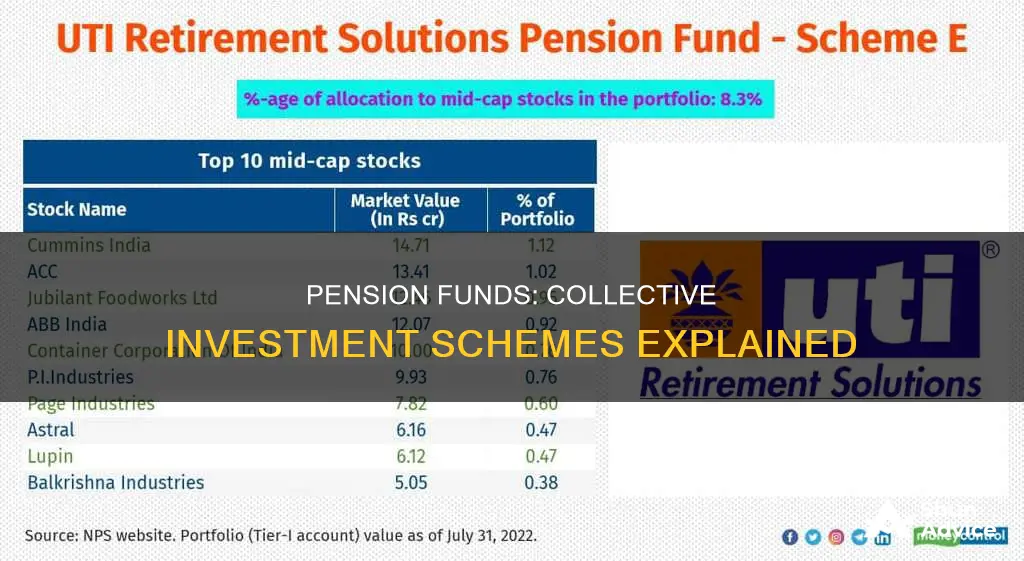
A pension fund is a program, fund, or scheme that provides retirement income. It is a type of collective investment scheme, which is a legal concept initially derived from a set of European Union Directives to regulate mutual fund investment and management. Collective investment schemes allow individuals to invest their money alongside other investors, providing benefits such as reduced investment risk, lower transaction costs, and increased asset diversification. Pension funds are typically large pools of money that are invested in stocks, bonds, real estate, and other assets. They are important financial institutions that manage the retirement savings of millions of people.
What You'll Learn

Pension funds are a type of collective investment scheme
Pension funds are typically large and are major investors in listed and private companies, especially in the stock market. They are an important type of collective investment scheme, as they manage the retirement savings of millions of people.
The first professionally managed collective investment schemes were established in the Dutch Republic. Today, pension funds are regulated differently depending on the country. In the United States, pension plans are mainly regulated by the Employee Retirement Income Security Act 1974 (ERISA). In the United Kingdom, the primary statute is the Financial Services and Markets Act 2000. In the European Union, Directive 2003/41/EC regulates pension funds.
Pension funds are often classified as either defined contribution (DC) or defined benefit (DB) schemes. In a defined contribution scheme, the investor only knows how much they pay in every month, not how much money they will have when they retire, as the money is subject to fluctuations in the stock market. In a defined benefit scheme, the investor knows how much money they will receive when they retire.
Maximizing HSA Funds for FI: Where to Invest Wisely
You may want to see also

Pension funds are managed by pension fund managers
Pension funds are a type of investment fund, created by a fund manager to help an individual's pension grow. Fund managers combine the pension contributions of different savers into one giant pot, which is then invested in a range of financial assets, including equities, bonds, gilts, property, and even cash. The fund manager's job is to make sure all investments are made with the goal of achieving the best possible return for the individual.
Pension fund assets must be prudently managed to ensure that retirees receive their promised retirement benefits. This means that pension funds are limited in the types of investments they can make. Historically, pension funds invested primarily in stocks and bonds, often using a liability-matching strategy. However, in recent years, pension funds have increasingly invested in a variety of asset classes such as private equity, real estate, infrastructure, and securities like gold that can hedge against inflation.
The specific investments made by a pension fund will depend on its size. Larger funds, such as the California Public Employees' Retirement System (CalPERS), self-manage their stock portfolios. On the other hand, smaller funds are more likely to seek outside management or invest in institutional versions of mutual funds and exchange-traded funds (ETFs).
Pension funds can also be classified as either managed pension funds or tracker pension funds. Managed pension funds are actively managed by a fund manager (or group of fund managers) to achieve the best returns. The fund manager regularly changes the makeup of the fund, taking into account recent performance and real-world events. Tracker pension funds, on the other hand, are passively managed and aim to automatically follow a wider index such as the FTSE 500. These funds tend to have lower fees than actively managed funds.
Overall, pension fund managers play a crucial role in helping individuals grow their pension savings by investing their contributions in a diverse range of financial assets. The specific investments and strategies employed depend on the size and type of pension fund, but the ultimate goal is always to generate the best possible returns for retirees.
Mutual Funds vs Annuities: Where Should You Invest?
You may want to see also

Pension funds are regulated by pension laws
Pension funds are a type of financial mechanism that provides retirement income for employees after their working life. They are regulated by pension laws, which vary from one jurisdiction to another. In the US, private pension plans are regulated by federal laws such as the Employee Retirement Income Security Act (ERISA) and are insured by the Pension Benefit Guaranty Corporation (PBGC). This means that if a pension plan fails, the PBGC guarantees that employees will still receive their benefits.
Public pension funds, on the other hand, are regulated under public sector law. In the US, public pension funds are regulated by state governments and sometimes state constitutions. For example, local governmental bodies in the United States are subject to laws passed by the states in which those localities exist. These laws include provisions such as defining classes of permitted investments and minimum municipal obligations.
In Europe, pension regulation has been influenced by the 2008-2009 financial crisis, with some experts arguing that excessive regulatory activism can have negative unintended consequences.
Overall, pension regulation aims to provide norms and standards to foster market efficiency, consistency, transparency, and accountability in the pension industry. It is a key driver of pension funds' risk management and helps ensure the stability and performance of these important financial institutions.
Funding Your Capital One Investing Account: A Guide
You may want to see also

Pension funds are important financial institutions
Pension funds are financial mechanisms that provide retirement income for employees after their working lives. They accumulate contributions from employers and, in some cases, employees, which are then invested to grow over time. Upon retirement, employees receive benefits, typically calculated as a percentage of their average salary during their final years of employment.
Pension funds are institutional investors, and they invest large pools of money into private and public companies. They are especially important to the stock market, where large institutional investors dominate. The largest 300 pension funds collectively hold about $6 trillion in assets. In 2012, PricewaterhouseCoopers estimated that pension funds worldwide hold over $33.9 trillion in assets, and this was expected to grow to more than $56 trillion by 2020. This makes pension funds the largest category of institutional investors, ahead of mutual funds, insurance companies, and hedge funds.
Pension funds are typically managed by companies (employers). The main goal is to ensure there will be enough money to cover the pensions of employees after their retirement. To achieve this, pension funds aim for portfolio diversification, allocating capital to different investment instruments such as stocks, bonds, derivatives, and alternative investments.
Pension funds have to be prudently managed compared to other types of funds due to their lower risk tolerance. For many years, they primarily invested in stable stocks and bonds. However, with changing market conditions, they have started to diversify into other assets. Currently, many pension funds are moving away from actively managing stock portfolios and are instead investing in passive investment methods, focusing on index funds and exchange-traded funds (ETFs) that replicate market indices. There is also an increasing trend to allocate capital to alternative assets like commodities, high-yield bonds, hedge funds, and real estate.
Best Vanguard Funds for Your Taxable Investment Portfolio
You may want to see also

Pension funds have a long history
During the early 20th century, pension plans for public employees gained traction, leading to the creation of a U.S. federal retirement plan, known as Social Security, in 1935. After World War II, pension funds became the primary tool for providing retirement benefits, supported by the growth of labour unions. By the 1970s, pension funds held significant financial assets and had become significant participants in financial markets.
In the United States, pension plans are mainly regulated by the Employee Retirement Income Security Act of 1974 (ERISA). This legislation provides a framework for the regulation of private pension funds and guarantees workers' benefits. Additionally, the Pension Benefit Guaranty Corporation (PBGC) was established to protect retirement incomes for over 31 million American workers, retirees, and their families.
The evolution of pension funds continued with the introduction of the Pension Protection Act in 2006, which brought new funding requirements and rules for defined pension plans. Pension funds also faced challenges during this period, including the stock market crash of 1987 and the recession in the early 1990s, which negatively impacted their performance.
Today, pension funds are important financial institutions, managing the retirement savings of millions of people worldwide. Effective governance is crucial to safeguard these funds and ensure they meet their future obligations. The structure, strategies, and practices of pension funds play a significant role in their stability, performance, and the trust of their stakeholders.
U.S. Investment Fund Transition to Schwab: What, When, Why?
You may want to see also
Frequently asked questions
A pension fund is a program, fund, or scheme that provides retirement income. Pension funds typically have large amounts of money to invest and are major investors in listed and private companies, especially in the stock market.
A collective investment scheme is a legal concept initially derived from a set of European Union Directives to regulate mutual fund investment and management. It refers to any arrangements with respect to property of any description, including money, that enables persons taking part in the arrangement to participate in or receive profits or income arising from the acquisition, holding, management, or disposal of the property or sums paid out of such profits or income.
Yes, pension funds can be considered a type of collective investment scheme. They are financial mechanisms that pool contributions from employers and employees to generate returns and provide retirement income for employees.
Collective investment schemes offer several advantages for pension funds, including:
- Risk reduction: By pooling funds, pension funds can reduce investment risks and benefit from economies of scale, such as lower transaction costs.
- Professional management: Collective investment schemes can hire professional investment managers who may offer better returns and more adequate risk management.
- Diversification: Collective investment schemes can invest in a diverse range of assets, reducing unsystematic risk.







